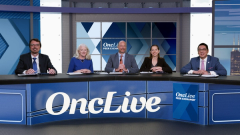
Selecting Among Available AR Inhibitors in Nonmetastatic CPRC
A comprehensive discussion on factors that inform treatment selection of available AR-targeted therapy for patients with nonmetastatic CRPC.
Episodes in this series

Transcript:
Evan Y. Yu, MD: Tanya, I know that it has been mentioned in the options, but I would love to hear from you what your thoughts are on the different options for somebody with M0 castration resistant prostate cancer and what consideration you take into account in selecting different agents?
Tanya B. Dorff, MD: Another impossible question because the trials for all 3 agents apalutamide, darolutamide, and enzalutamide in M0CRPC setting were remarkably similar in design and in outcomes. They have all shown not only metastasis-free survival advantage, which was the original primary endpoint but also strong survival advantage occurring across the board and fortunately without a big deterioration in quality of life, in fact all 3 studies have reported out subsequently that there is a delay in deterioration of quality of life by using the agents, so we don’t have symptoms. These are non-metastatics so we shouldn’t have symptoms, we are not palliating but we are delaying the time until the disease grows to a point where it causes our patient to feel it. By doing so, we are maintaining quality of life and that’s important when we’re talking to patients to be able to yes there maybe adverse effects, we can dose modify, we can think about switching to a different drug, whatever the case maybe but by in large your quality of life should be good despite this drugs and it’s going to delay the time to you having to feel or really think about your cancer more on a day-to-day basis. There was also very interesting analysis from Eric Small looking at a couple of studies and PSA kinetics and how that impacts quality of life. It’s often easier for us on this study of the stethoscope to say don’t worry your PSA is going up, you’ll be OK but for the patient his data clearly shows that big drops in PSA are associated with better quality of life, and it just makes sence.
Evan Y. Yu, MD: Mary-Ellen I am going to ask you similar question about different agents that are available and your thoughts on different adverse event profile and how you might select between these?
Mary-Ellen Taplin, MD: We’re talking about AR antagonist, enzalutamide, darolutamide, and apalutamide.
Evan Y. Yu, MD: And I would also love to hear if any of you would ever use abiraterone but go-ahead Mary-Ellen.
Mary-Ellen Taplin, MD: Like the conversation before, I mean they all have slightly different profiles, but the first thing is to establish the baseline of your patient, what you think that the person can tolerate. They all potentially can cause fatigue and hypertension and risk for falls I would say, those are the big 3 for the class of medicine. There is a very small risk of seizures particularly with enzalutamide and apalutamide. In at least 10 years of using these drugs I have seen it once, so it’s fairly uncommon and it’s not something I tend to think or worry a lot about unless my patient obviously has a history of seizure disorder. Apalutamide can cause rash in about 25% or 35% of patients. In general, the rash is tolerable, but it was 7% or so of patients the medication of apalutamide had to be stopped because of rash, so something to be aware of. What we have learned over the years is that if your patient is having an adverse effect to one of these drugs, you can give them a break, let the side effect resolve, and then resume the medication at a lower dose 50%, 75% dose, and either stay there if the patient appears to be responding well on the reduced dose of drug or work your way back up to 100% of the dose. With non-metastatic setting as opposed to metastatic setting you have a lot of licenses to give patients a break or reduced dose to address their side effects.
Evan Y. Yu, MD: Does anybody have a preference of agents? I am just going to call; everyone is so diplomatic here in this group.
Tanya B. Dorff, MD: I will say when you look at the darolutamide versus placebo adverse effects the rates are remarkably similar, so conceivably that should be one that would cause fewer adverse effects whether that is clinically something that we experience in our day-to-day practice as being different than the other things, I do think potentially if I am concerned about falls the differential on the darolutamide trial for fall is between darolutamide and placebo was really minimal. If I am really worried about that or cognitive changes then I might reach for the darolutamide.
Pedro C. Barata, MD, MSc: I agree with you by the way, that’s why I have in my experiences. A concordant with the data and it also helps to tell the story, so it makes sense. As we know, preclinical data suggesting that darolutamide perhaps doesn’t cross the blood brain barrier, doesn’t mess up with chloride channels, either way the other 2 agents do, which would explain exactly what we are referring as adverse effects, less dizziness, and less falls, seizure. All of that helps to tell the story, it’s a good story, you make sense from a pharmacological perspective and I have to say it’s also my experience. My other comment would be the reality of it is, it’s a good problem to have because in a lot of times what the physician is comfortable with. I do believe over time this is going to be a moot point because with incorporation of PET scanning and less anxiety of putting patients on hormone as well as PSA 0.1 going to, what happens with those 2 phenomena is actually you develop less CRPC soon or you delay CRPC. And other perspective with such a sensitive way of detecting metastatic disease, you are having a tumor migration into the metastatic space where in then our discussion will be different. All that combined are super important because it makes the point that helps to tell the story better, also the point about the metastatic-free survival and overall survival like how that is clinically significant with delta, there is a big delta. It is important delta and my only comment about abiraterone would be we do have phase 2 data. The trial is called IMAGINE and it was published by the way the numbers were not that different although it was a smaller study, we take it with a grain of salt, but my comment to that is I wouldn’t be actually very surprised to see the numbers being that different because we do see the NHC being beneficial to patients and that’s the message.
Transcript edited for clarity.








































